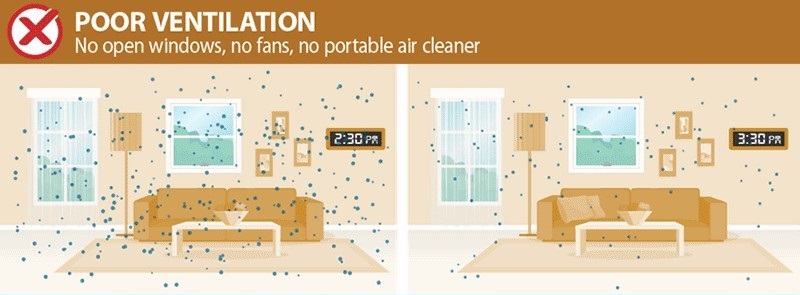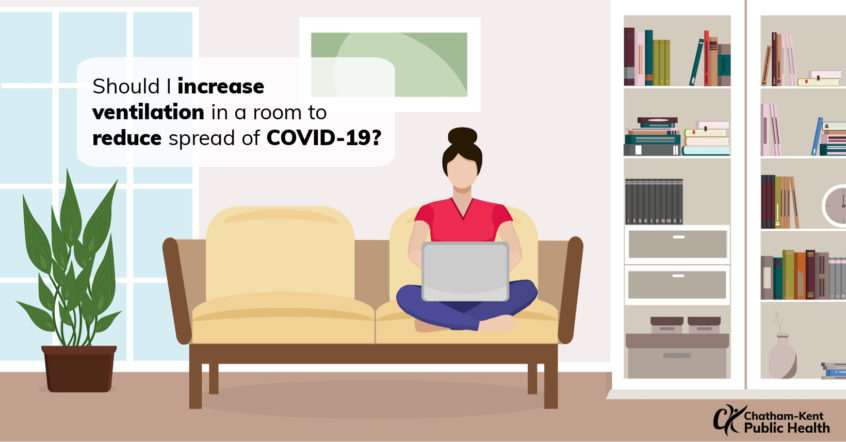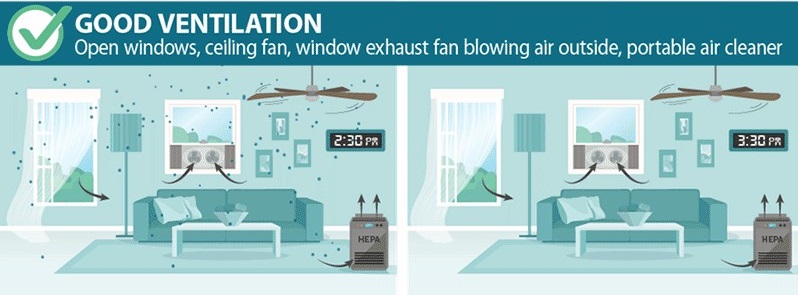Air it Out! COVID-19 and Home Ventilation
With the colder weather and the holiday season upon us, people are more likely to gather indoors.
Staying home and gathering with only those in your immediate household remains the safest option. However, understanding how ventilation in indoor spaces can help control the spread of the COVID-19 virus is important to making small indoor gatherings more safe.
How does COVID-19 spread?
The virus causing COVID-19 spreads from person to person through aerosols and respiratory droplets. These are produced when we breathe, speak, sing, shout, laugh, sneeze, and cough. Due to gravity, larger and heavier droplets fall quickly. Smaller and lighter droplets, the aerosols, remain suspended in the air for longer – like second-hand smoke. You can become infected with COVID-19 if you inhale these infectious particles.
The risk of COVID-19 spreading because of aerosols is possible when there are gatherings of people indoors for a longer period. Proper airflow and ventilation can help reduce the risk by reducing aerosols.
The pictures below may help you to visualize what these aerosols are like and how long they can stay in the air.
This picture shows a room with poor ventilation. In this room, many aerosols remain in the air for a long time — even after people are not there for a while.
This picture shows a room with good ventilation. In this room, fewer aerosols are in the air to start and good ventilation helps to clear those particles quickly.
Ways to improve ventilation and air filtration in your home
There are many ways to help improve ventilation in your home. For example, you can:
- Open windows and doors regularly to create a cross-breeze of fresh air.
- Even if it’s cold or wet outside, opening your window for a few minutes at a time will help.
- Use a heating, ventilation and air conditioning (HVAC) system.
- Run heat or energy recovery ventilators continuously.
- Run outdoor vented kitchen and/or bathroom exhaust fans frequently.
- Open a window to provide clean replacement air and to avoid re-circulating contaminated air.
- Use a portable air purifier with a high-efficiency particulate air (HEPA) filter.
Remember to do routine maintenance on mechanical systems. Keep the vents and fans clear, and change the filters when recommended. If possible, run the HVAC system fan continuously. This will increase the amount of clean air and reduce infectious particles indoors.
There are signs a space may be poorly ventilated. They are:
- Stuffiness
- Persistent odours
- No mechanical ventilation (heating or cooling systems) or air filtration
- Closed Windows and doors
- High humidity
- Mould
Although good airflow is important to preventing the spread of COVID-19 and other illnesses, it is important to remember that good airflow and ventilation do not replace the need for public health measures including:
- Avoiding crowded spaces.
- Maintaining 2-metres of physical distance with people who aren’t in your household.
- Wearing a well-fitted, 3-layer mask.
- Practicing good hand hygiene.
As always, please refer to the current rules and regulations in Chatham-Kent before planning a gathering. The safest option is to stay home and interact with household members only.
For more information on ventilation see:


